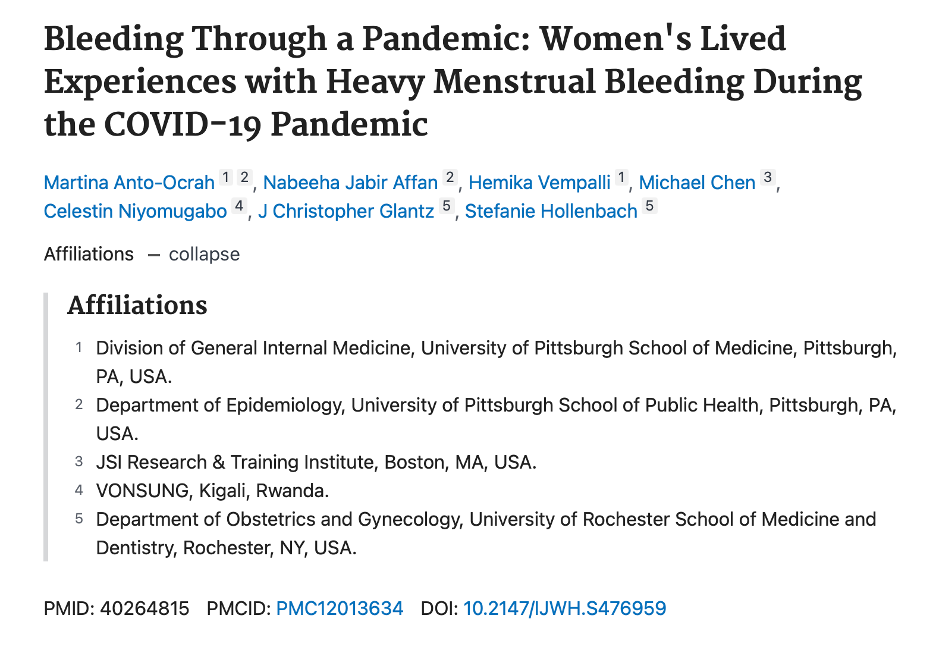
The Hidden Burden of the Pandemic: How COVID Stress Intensified Heavy Menstrual Bleeding and Impacted Women's Well-being
The COVID-19 pandemic brought unprecedented challenges to our lives, and while much focus has been on the direct effects of the virus, a silent struggle unfolded for many women: the intensification of heavy menstrual bleeding (menorrhagia). Our recent study, published by Anto-Ocrah et al., sheds light on the significant connection between pandemic-related stress and this often debilitating condition, as well as its profound impact on women's mental health and daily lives.
Menorrhagia, affecting an estimated 10 million reproductive-age women in the US annually, is more than just an inconvenience. It can lead to significant physical, emotional, and financial burdens. Recognizing that stress is a known trigger for menstrual irregularities, we investigated the hypothesis that the unique stressors of the COVID-19 pandemic would be associated with increased menorrhagia and decreased mental well-being.
Our cross-sectional study, conducted in May 2021, surveyed 360 naturally cycling women aged 18-45 across the United States. We assessed menorrhagia using the Aberdeen Menorrhagia Severity Scale (AMSS), COVID-related stress with the Perceived Stress Scale (PSS-10-C), and mental health using the Mental Health Continuum Scale (MHC-SF).
Key Findings: A triple threat of stress, bleeding, and mental health
The results of our analysis revealed a concerning pattern:
- Increased COVID stress linked to heavier bleeding: Women experiencing heavy menstrual bleeding reported significantly higher levels of COVID-related stress compared to those with normal bleeding (p < 0.01). Furthermore, our regression analysis showed that as COVID stress increased, the severity of heavy bleeding also intensified (adjusted β = 0.37, 95% CI: 0.21, 0.53). This suggests that the unique pressures of the pandemic, including increased caregiving responsibilities and disruptions to daily life, may have exacerbated menstrual bleeding.
- Heavy bleeding worsened mental health: We also found a significant negative association between the severity of heavy bleeding and mental health (p = 0.03). After adjusting for pre-existing depression, our models indicated that as heavy bleeding increased, psychological well-being declined (adjusted β = -0.1, 95% CI: -0.24, -0.03). This highlights the significant emotional toll that heavy periods can take on women.
- Lived experiences of heavy bleeding during the pandemic: Comparing women with mild menorrhagia to those with moderate/severe menorrhagia revealed stark differences in their lived experiences:
- Pain and incapacitation: Women with heavy bleeding were significantly more likely to report severe or very severe menstrual pain and experience bed confinement due to their periods.
- Socialization and sex Life: Heavy bleeding negatively impacted socialization and sex lives to a greater extent compared to mild bleeding, potentially affecting interpersonal relationships and overall quality of life.
- Menstrual Product Use: Those with heavy bleeding consistently reported needing to use large quantities of menstrual products, often requiring multiple products simultaneously, including menstrual cups, to manage their flow.
- Incidence of new-onset heavy bleeding: Alarmingly, within the group experiencing moderate/severe menorrhagia, nearly 40% reported that this heavier bleeding pattern was new since the start of the pandemic, a significantly higher rate compared to the mild bleeding group (13.1%, p < 0.01). This suggests that the pandemic may have triggered new cases or worsened pre-existing conditions for many women.
- Demographic factors: Our bivariate analysis indicated that women with heavy bleeding were more likely to identify as African American/Black (p = 0.04), be in unmarried relationships (p = 0.01), be current smokers (p < 0.01), have a history of pre-pandemic clinical depression (p < 0.01), and have a history of gynecological/reproductive comorbidities (p = 0.02). This underscores the importance of considering these factors in understanding and addressing heavy menstrual bleeding.
Implications and the Path Forward
Our findings underscore the complex interplay between stress, menstrual physiology, and overall well-being. The pandemic not only presented direct health threats but also created a web of stressors that significantly impacted women's reproductive health. The increased incidence of new-onset heavy bleeding during this period is particularly concerning and warrants further investigation into long-term effects.
The challenges faced by women with menorrhagia during the pandemic, including increased pain, social isolation, negative impacts on sexual health, and the financial strain of managing heavy flow, highlight the need for greater awareness and support. Healthcare providers should be mindful of the potential for increased menstrual issues in the context of significant stress and screen for both physical and mental health concerns in patients presenting with heavy bleeding.
Furthermore, our study reinforces the importance of accessible and affordable menstrual products. The financial burden of managing heavy flow, especially during times of economic hardship, can create a vicious cycle of stress and poor menstrual health.
While our study provides valuable insights, the cross-sectional nature limits our ability to determine causality and understand the long-term trajectory of these issues. Future longitudinal research is crucial to assess the chronicity of pandemic-related menorrhagia and its lasting impact on women's lives.
Ultimately, our findings call for increased awareness of the interconnectedness of stress, menstrual health, and mental well-being, particularly during times of crisis. By acknowledging and addressing the hidden burdens faced by women, we can work towards more comprehensive and equitable healthcare that supports their overall health and quality of life.
Click here to read full article